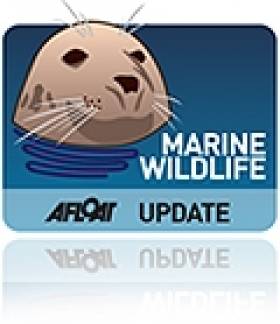Displaying items by tag: Dragonfish
Dragonfish Discovery in River Suck Highlights Danger of Illegal Aquarium Releases to Native Wildlife
#marinewildlife – The recent discovery by a local angler of the decaying remains of an exotic fish specimen in the River Suck at Correen Ford in the Midlands has raised further concern of the threat to our native wildlife from aquarium releases by otherwise well-meaning individuals. This latest discovery followed by that of a Yellow-bellied Slider turtle on the River Maigue, in Co. Limerick last week.
Despite the partially decomposed state of the fish, Inland Fisheries Ireland (IFI) staff, in consultation with international experts, believe the six inch-long, sharp-toothed specimen to be a Dragonfish (also known as a Violet or Dragon Goby). This fish is native to North and South America and can be purchased in Ireland for private aquariums.
As it is regarded as a warm water species, the Dragonfish is not considered to be able to survive in the wild in Ireland. However, according to Dr Joe Caffrey, Senior Research Officer with IFI, "There are many exotic species of potential concern sold in the aquarium trade in Ireland. These include non-native freshwater fishes, crayfish and aquatic plants. If these are released to the wild they could seriously threaten our native biodiversity and ecosystem function, and the continued conservation of internationally important native species in our rivers and lakes. It is imperative that the public and all stakeholders are aware of the potential damage that exotic animals or plants which are deliberately introduced to the wild can inflict upon our unique wildlife and habitats."
In recent years, human-mediated introductions of non-native species such as Asian Clam, Australian Swamp Stonecrop, South African Pondweed and Zebra Mussel into Irish waterways have resulted in detrimental impacts to native species and habitats, degraded the amenity value of areas that become infested and required costly control measures to be implemented to mitigate these impacts.
Under the European Communities Birds and Natural Habitats Regulations 2011, the unlicensed release to the wild of any animal species, which is not ordinarily resident in Ireland or a regular visitor to the country, in a wild state is an offence.
Any sightings of exotic plants or animals found in or around our waterways can be reported to IFI through the 'IFI Invasive Species' smart phone app which is available to download from the Google Play and iTunes App stores.
The app aids users to report and identify exotic species and take geo-referenced photographs that can immediately be sent to IFI scientists for review. If the sighting is of something new or particularly worrying, this will trigger an immediate on-site survey by IFI staff. IFI want as many people as possible to use this app and help it in its ongoing battle against aquatic invasive species.






























































